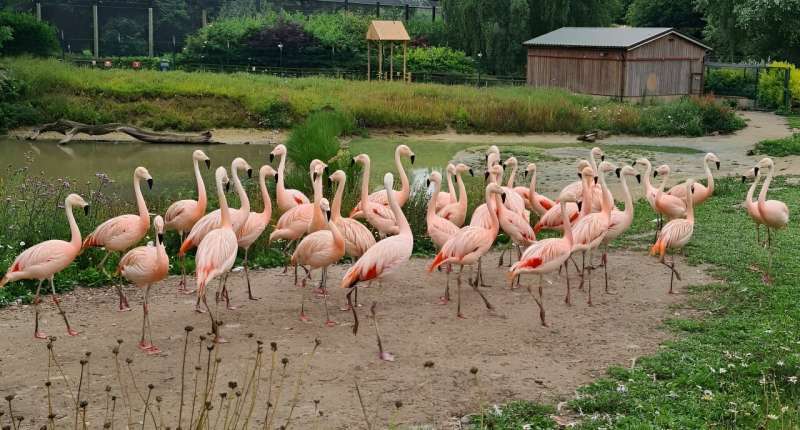This article has been reviewed according to Science X's editorial process and policies. Editors have highlighted the following attributes while ensuring the content's credibility:
fact-checked
trusted source
proofread
Birds need entertainment during avian flu lockdowns

Scientists have studied a flock of Chilean flamingos that were kept indoors due to a government order to stop the spread of avian influenza and found that birds need varied activities during avian flu lockdowns.
The flamingos were very inactive during the lockdown and just after release, and were more alert while kept indoors. They also displayed unusual behavior during and after the lockdown. The study is published in the Journal of Zoological and Botanical Gardens.
"This project started because keepers noticed the birds performing an unusual behavior—dropping their heads as if filter-feeding when they weren't in the water," said Dr. Paul Rose, from the University of Exeter.
"Chilean flamingos perform this sweeping action to filter-feed in water, and they had access to a pool while kept indoors, but for some reason they were making this motion on dry land.
"We can't say exactly why they did this, but it shows that birds need a variety of foraging and bathing opportunities to allow them to perform their natural behaviors."
This "mock" filter-feeding continued after the flamingos were allowed back outside, suggesting it takes time for natural behavior patterns to reestablish after lockdowns.
The higher level of alertness indoors is thought to be due to the proximity of humans—the flock being locked inside meant keepers had to be closer than usual to feed and care for them.
Dr. Rose added, "Our study shows the difficulty of trying to decipher animal well-being just by observing their behavior.
"To assess birds' welfare, it's better to consider a range of information—including social behavior, resting and plumage condition."
Plumage is an especially important sign of flamingo health—they spend much of their time preening, and a flamingo with rich pink feathers is likely to be very healthy.
Dr. Rose was surprised to find plumage condition improved when flamingos were inactive—but this may be explained by the birds experiencing less disturbance after lockdown, meaning feathers were less likely to get ruffled.
Commenting on the study's wider implication for bird keepers—from zoos to people who keep pet chickens—Dr. Rose said, "Lockdowns prevent the spread of disease but birds also have behavioral requirements.
"Know your animal. They are hard-wired to do certain things, so you should try to provide opportunities—whether that means roosting, feeding in certain ways, or whatever else they do."
The flamingos in the study were at Banham Zoo in Norfolk, U.K.
More information: Thomas Collard et al, Evaluating Potential Indicators of Welfare for Zoo Birds during an Avian Influenza Enforced Housing Order, Journal of Zoological and Botanical Gardens (2024). DOI: 10.3390/jzbg5030028
Provided by University of Exeter





















